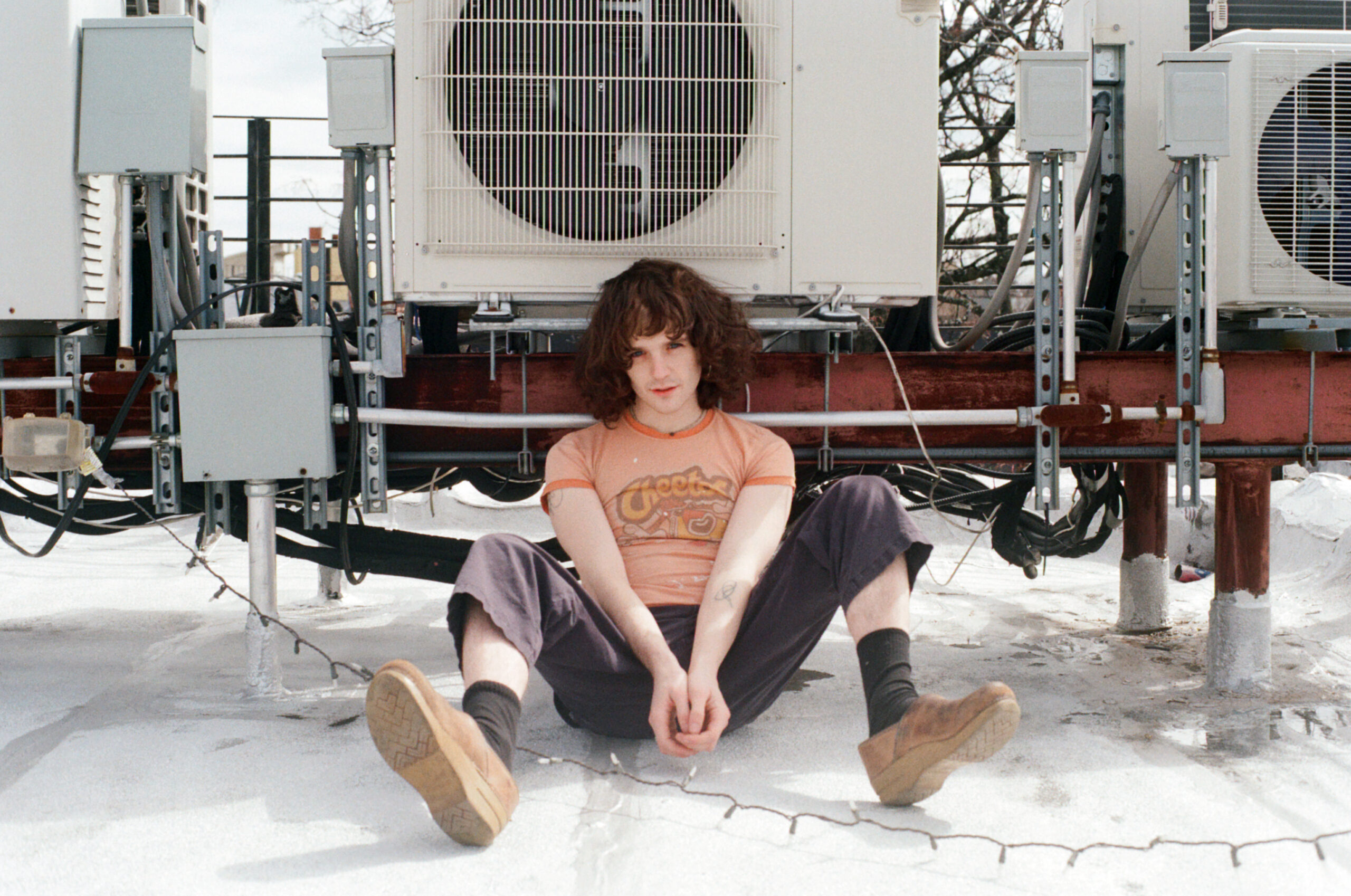Plenty of bands have long histories, forged from bonds of friendship formed in a distant childhood past. Shared upbringings, shared surroundings -- these can provide good raw material for a couple artists to come together and define their identity within and against the rest of the world. In the case of Isaac deBroux-Slone and Raina Bock, the duo behind Disq, those roots go way back. In fact, the two met when they were still babies.
"I don't know the exact date but it must've been within the first week I was born. So, pretty early on," Bock explains with a laugh. "Our parents had been good friends forever before we were born." For a while, she and deBroux-Slone were more like family friends, seeing each other on holidays and such. As they approached their teenage years, it became clear that their musical interests and ambitions didn’t line up with a lot of their peers. So they began playing together and set off to establish their name in the local scene in Madison, Wisconsin.
As it turns out, that origin story doesn’t start all that long ago. Neither deBroux-Slone nor Bock is yet 20 years old. The two of them work on Disq music together, with deBroux-Slone serving as frontman and often bringing in the skeletons of the songs; live, Bock plays bass in a band that's now grown to members onstage. Over the last couple of years, they’ve been expanding their songwriting range and gradually garnering attention around the States. When I speak to each of them, they’ve just played their first show in LA -- one of their first dates outside of the Midwest. Next week, they’ll be featured at a Stereogum show during SXSW, one of many new horizons for a young band that is catching on pretty fast.
It helps that both deBroux-Slone and Bock came from artistically-inclined families. Bock grew up in a town called Viroqua; with a population of just over 4,000 and located a couple hours from Madison, it functioned as something of a removed artist commune. "It’s out in the middle of cornfields and there’s nothing around it and there’s this strange Waldorf school that attracts a lot of creative people," she explains. "There's absolutely nothing to do. There's a shit movie theater and that's about it. So basically your options are you can get really deep into psychedelic drugs or you can get really deep into art, and that's pretty much how it goes."
Bock focused on the latter, attending music camps and workshops from a young age but quickly discovering she didn’t have much of a taste for technical traditions and theory. Meanwhile, deBroux-Slone taught himself to produce in his mom’s basement, using demo software given to him by his father, who used to run a theater in Madison. From an early age, it was clear to each of them that this was their path forward. "I thought about doing other things for fun, but it’s always been no question for me what I thought I was going to do in life," deBroux-Slone says.
"If this doesn’t work out, I’m shit out of luck," Bock says, a bit more jokingly. "I really put all my eggs in one basket. We’re both super lucky to have families who are supportive of that."
In their early teens, deBroux-Slone and Bock began playing in different groups together -- some covers, competing in Battle Of The Bands, the typical stuff. But in just a handful of years, before either was out of high school, they’d also completed a Disq album. Fittingly titled Disq I, it’s still available on their Bandcamp and offers a glimpse of artists coming into their own. With deBroux-Slone still heavily inspired by Tame Impala, Disq I was a psych-pop recording of above-average competence considering what you might picture when something’s described as "a pyshc-pop album heavily inspired by Tame Impala made by small-town teenagers." But it was also something they’d swiftly move past.
Along the way, Disq began engaging with the scene surrounding them, playing house shows with bands in their early 20s, and soon getting booked to open gigs at the local Madison venues when other indie artists like Quilt, Jay Som, Whitney, and Twin Peaks came through town. Amidst those experiences, they’ve moved towards a rawer, heavier sound that, with its particular collection of influences, often recalls ‘90s indie more so than the psych-rock of the ‘60s or ‘70s. In the early press Disq have received, they’ve often cited or been compared to names like the Beatles, Todd Rundgren, Weezer, and Big Star. (The latter was more of an influence attributed to them, which has since spurred deBroux-Slone to dig into Big Star’s catalog, in turn promising even more power-pop in the Disq material to come.) "When we wrote that first album we were in 8th grade, freshmen," Bock remembers. "[We’re in] a much different place with our musical influences now for sure."
They’ve stripped away the production affectations, but still like to incorporate "weird little complexities that nobody’s going to notice but is going to make it unnecessarily hard for ourselves to record and play." Bock says they’ve both gotten deep into Brainiac. DeBroux-Slone namechecks artists trafficking in contemporary post-punk like Women and their later offshoot Preoccupations, "more technical guitar music that’s still punk, or not obnoxious."
Disq’s new sound was evident on two recent singles, "Communication" and "Parallel." The tracks were released as part of Saddle Creek’s Document series, a sort of restart after deBroux-Slone and Bock had an initially negative introduction to the larger mechanisms of the music industry -- the TL;DR of which is that they met a producer who expressed interest in their work but, in an apparent attempt to take advantage of two young artists, tried to spin recording sessions into an overall management/development deal and subsequently refused to give Disq their finished recordings upon them declining the offer. While both deBroux-Slone and Bock characterize their interactions with Saddle Creek as a far better entry into the business side of things, it was by nature a one-off; the two are currently talking to labels and trying to find a home for their forthcoming, official debut album.
Compared to the reverb- and effects-laden sounds of Disq I, "Communication" and "Parallel" are more of a hint at where deBroux-Slone and Bock are now as songwriters. The former begins as a fizzy alt-rock jam that eventually bursts into a plaintive chorus grappling with the inherent distance between us even as try to relate to one another. "Parallel" carried their older aesthetic forward, a blooming psych-rock track in which deBroux-Slone’s sunny vocals are underpinned by more ragged instrumentation than in the past.
From there, Disq are finishing up their debut album, which also splits the difference between lightly psychedelic flourishes and more ramshackle singer-songwriter endeavors. Thematically, the new material also finds them in a different, older place -- both members remark on how "most of that first album is girls and heartbreak" whereas the stuff they’re working on now aims to take on a broader array of topics. While Bock contributes lyrics on occasion and the two are trying to move towards a more collaborative process in general, the content of the new Disq songs still mostly comes from deBroux-Slone. He tends to write from places of frustration, working out a conflict in his mind. But he’s also eager to diversify the moods in the new music, occasionally working with words that are "more abstract, where it’s not just me saying how I feel bad," he describes matter-of-factly.
There’s a song that ruminates on daily routine, trying to break the monotony with clangorous, feedback-tinged music. There’s an ode to a vintage microphone, and a meditation on loneliness. There are moments in which the songs collapse in on themselves in miniature psychedelic episodes, and there is plenty more of the power-pop/alt-rock/lo-fi glam we’re starting to expect from this band. Most importantly: Throughout their new material, hooks are abound, each earworm melody reiterating how sharpened Disq’s songwriting has become.
Disq are in a peculiar place for a band: At the same time they have been doing this for so many years already, that was often limited to their lives in Wisconsin. Now, things are escalating quickly, at the same that any person would be going through significant life changes. Bock recently relocated to Southern California for college, placing the two halfway across the country from one another for the first time. (It’s a hurdle they’ll need to work around in order to make music in the near future, but maybe not for too long; Bock admits not taking to certain influencer aspects of California culture that weren’t as prevalent in Wisconsin, mentioning in the same breath that she'd gone as far as to trade her smartphone for an old-school flip-phone.)DeBroux-Slone, for his part, has no immediate plans to leave his hometown. As the years go on, both of them seem to appreciate the underdog qualities that come with being from a place other than coastal epicenters of hipness.
Perhaps it’s that, or perhaps it was the fact that this is all they ever planned to do, but both of them are taking their in newfound attention without overreacting, without becoming too daunted. DeBroux-Slone admits they’re still adjusting to the business side of things, and the pace of all of it, but is quick to confirm they’re ready for it all. "We were hoping for this step all along, so we’re really glad to be there mostly," he says. "It doesn’t feel like anything that we won’t be able to do."
Bock remembers all the years playing locally that led up to this. She remembers all the trials by fire that came with how young she and deBroux-Slone were when they started. And, maybe, that allowed them to come out to this other side, when people around the country are just starting to learn who Disq are, a bit more assured. "When we were on these bigger bills, you have to prove yourself in a special way when you’re young," Bock says. "Even if it’s just OK, people will clap for you because you’re a kid, you know? People will pretend they like it. I had to prove it to myself."






